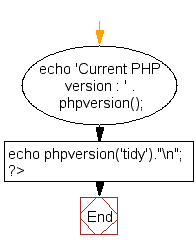PHP Exercises : Print current PHP version
PHP : Exercise-17 with Solution
Write a PHP script to print current PHP version.
Note : Do not use phpinfo() function.
Sample Solution: -
PHP Code:
<?php
echo 'Current PHP version : ' . phpversion();
// prints e.g. '2.0' or nothing if the extension isn't enabled
echo phpversion('tidy')."\n";
?>
Sample Output:
Current PHP version : 7.0.15-0ubuntu0.16.04.4
Flowchart:

Note: string phpversion (string $extension ): Returns a string containing the version of the currently running PHP parser or extension.
PHP Release History:
| Version | Release date | Supported until |
|---|---|---|
| 1.0 | 8 June 1995 | |
| 2.0 | 1 November 1997 | |
| 3.0 | 6 June 1998 | 20 October 2000 |
| 4.0 | 22 May 2000 | 23 June 2001 |
| 4.1 | 10 December 2001 | 12 March 2002 |
| 4.2 | 22 April 2002 | 6 September 2002 |
| 4.3 | 27 December 2002 | 31 March 2005 |
| 4.4 | 11 July 2005 | 7 August 2008 |
| 5.0 | 13 July 2004 | 5 September 2005 |
| 5.1 | 24 November 2005 | 24 August 2006 |
| 5.2 | 2 November 2006 | 6 January 2011 |
| 5.3 | 30 June 2009 | 14 August 2014 |
| 5.4 | 1 March 2012 | 3 September 2015 |
| 5.5 | 20 June 2013 | 10 July 2016 |
| 5.6 | 28 August 2014 | 31 December 2018 |
| 6.x | Not released | N/A |
| 7.0 | 3 December 2015 | 3 December 2018 |
| 7.1 | 1 December 2016 | 1 December 2019 |
| 7.2 | 30 November 2017 | 30 November 2020 |
Beginning on June 28, 2011, the PHP Group implemented a timeline for the release of new versions of PHP. Under this system, at least one release should occur every month. More details: https://php.net/releases/
PHP Code Editor:
Have another way to solve this solution? Contribute your code (and comments) through Disqus.
Previous: Write a PHP script to count number of lines in a file.
Next: Write a PHP script to delay the program execution for the given number of seconds.
What is the difficulty level of this exercise?
Test your Programming skills with w3resource's quiz.
PHP: Tips of the Day
How to Sort Multi-dimensional Array by Value?
Try a usort, If you are still on PHP 5.2 or earlier, you'll have to define a sorting function first:
Example:
function sortByOrder($a, $b) {
return $a['order'] - $b['order'];
}
usort($myArray, 'sortByOrder');
Starting in PHP 5.3, you can use an anonymous function:
usort($myArray, function($a, $b) {
return $a['order'] - $b['order'];
});
And finally with PHP 7 you can use the spaceship operator:
usort($myArray, function($a, $b) {
return $a['order'] <=> $b['order'];
});
To extend this to multi-dimensional sorting, reference the second/third sorting elements if the first is zero - best explained below. You can also use this for sorting on sub-elements.
usort($myArray, function($a, $b) {
$retval = $a['order'] <=> $b['order'];
if ($retval == 0) {
$retval = $a['suborder'] <=> $b['suborder'];
if ($retval == 0) {
$retval = $a['details']['subsuborder'] <=> $b['details']['subsuborder'];
}
}
return $retval;
});
If you need to retain key associations, use uasort() - see comparison of array sorting functions in the manual
Ref : https://bit.ly/3i77vCC
- New Content published on w3resource:
- HTML-CSS Practical: Exercises, Practice, Solution
- Java Regular Expression: Exercises, Practice, Solution
- Scala Programming Exercises, Practice, Solution
- Python Itertools exercises
- Python Numpy exercises
- Python GeoPy Package exercises
- Python Pandas exercises
- Python nltk exercises
- Python BeautifulSoup exercises
- Form Template
- Composer - PHP Package Manager
- PHPUnit - PHP Testing
- Laravel - PHP Framework
- Angular - JavaScript Framework
- Vue - JavaScript Framework
- Jest - JavaScript Testing Framework
